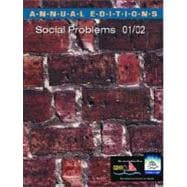| To the Reader | iv | ||||
| Topic Guide | 2 | (2) | |||
| Selected World Wide Web Sites | 4 | (2) | |||
| UNIT 1 Introduction: The Nature of Social Problems and General Critiques of American Society | |||||
|
6 | (3) | |||
|
9 | (8) | |||
|
|||||
|
|||||
|
|||||
|
17 | (4) | |||
|
|||||
|
|||||
|
21 | (10) | |||
|
|||||
|
|||||
| UNIT 2 Problems of the Political Economy | |||||
|
28 | (3) | |||
| A. THE POLITY | |||||
|
31 | (4) | |||
|
|||||
|
|||||
|
35 | (8) | |||
|
|||||
|
|||||
|
43 | (2) | |||
|
|||||
|
|||||
|
|||||
| B. THE ECONOMY | |||||
|
45 | (4) | |||
|
|||||
|
|||||
|
49 | (6) | |||
|
|||||
|
|||||
|
55 | (7) | |||
|
|||||
|
|||||
| C. URBAN ISSUES | |||||
|
|||||
|
59 | (3) | |||
|
62 | (7) | |||
|
|||||
|
|||||
| UNIT 3 Problems of Poverty and Inequality | |||||
|
66 | (3) | |||
| A. INEQUALITY AND THE POOR | |||||
|
69 | (6) | |||
|
|||||
|
|||||
|
75 | (3) | |||
|
|||||
| B. WELFARE | |||||
|
78 | (2) | |||
|
|||||
|
|||||
|
|||||
|
80 | (9) | |||
|
|||||
|
|||||
|
|||||
| C. RACIAL AND ETHNIC INEQUALITY AND ISSUES | |||||
|
89 | (3) | |||
|
|||||
|
|||||
|
92 | (7) | |||
|
|||||
|
|||||
| D. GENDER INEQUALITIES AND ISSUES | |||||
|
99 | (3) | |||
|
|||||
|
|||||
|
102 | (4) | |||
|
|||||
|
|||||
|
106 | (4) | |||
|
|||||
|
|||||
| E. DISADVANTAGED GROUPS | |||||
|
110 | (2) | |||
|
|||||
|
|||||
|
112 | (7) | |||
|
|||||
|
|||||
|
119 | (7) | |||
|
|||||
|
|||||
| UNIT 4 Institutional Problems | |||||
|
124 | (2) | |||
| A. THE FAMILY | |||||
|
126 | (6) | |||
|
|||||
|
|||||
|
132 | (4) | |||
|
|||||
|
|||||
|
|||||
|
136 | (5) | |||
|
|||||
|
|||||
| B. EDUCATION | |||||
|
141 | (5) | |||
|
|||||
|
|||||
|
146 | (9) | |||
|
|||||
|
|||||
| C. HEALTH | |||||
|
155 | (5) | |||
|
|||||
|
|||||
|
|||||
|
160 | (5) | |||
|
|||||
|
|||||
|
165 | (7) | |||
|
|||||
|
|||||
| UNIT 5 Crime, Violence, and Law Enforcement | |||||
|
170 | (2) | |||
| A. CRIME | |||||
|
172 | (5) | |||
|
|||||
|
|||||
|
177 | (6) | |||
|
|||||
|
|||||
| B. LAW ENFORCEMENT | |||||
|
183 | (6) | |||
|
|||||
|
|||||
|
189 | (6) | |||
|
|||||
|
|||||
| C. VIOLENCE AND TERRORISM | |||||
|
195 | (4) | |||
|
|||||
|
|||||
|
199 | (5) | |||
|
|||||
| UNIT 6 Problems of Population, Environment, Resources, and the Future | |||||
|
202 | (2) | |||
| A. POPULATION ISSUES | |||||
|
204 | (2) | |||
|
|||||
|
|||||
|
206 | (5) | |||
|
|||||
|
|||||
| B. ENVIRONMENTAL ISSUES | |||||
|
211 | (5) | |||
|
|||||
|
|||||
|
|||||
|
216 | (6) | |||
|
|||||
|
|||||
| C. THE FUTURE | |||||
|
222 | (3) | |||
|
|||||
|
|||||
| Index | 225 | (3) | |||
| Test Your Knowledge Form | 228 | (1) | |||
| Article Rating Form | 229 |








